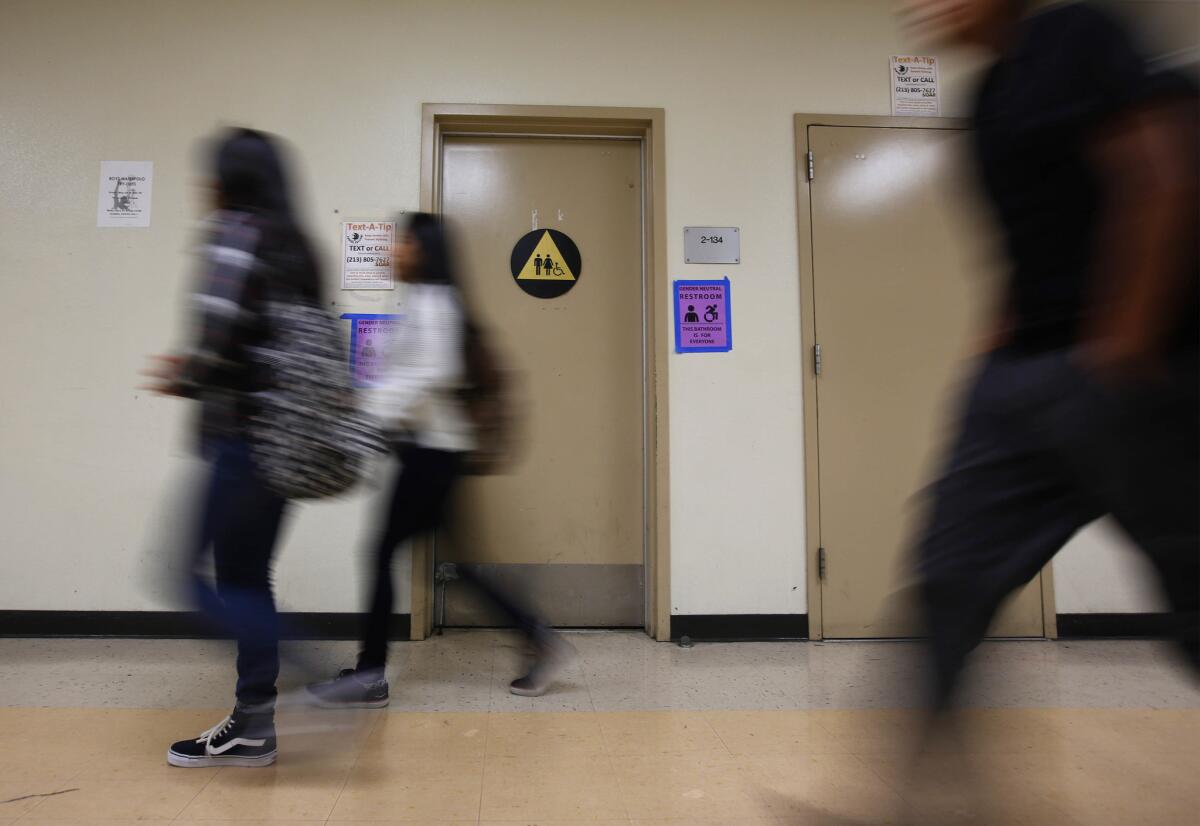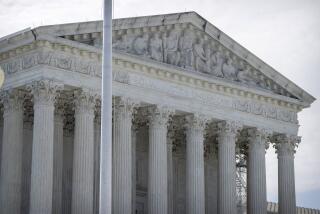Texas judge temporarily blocks Obama’s transgender directive on school bathrooms

Reporting from Atlanta — A federal judge in Texas has temporarily blocked the Obama administration from enforcing new guidelines that would allow transgender students to use bathrooms and locker rooms according to their gender identity.
Reed O’Connor, a district judge in Fort Worth, sided with Texas and 12 other states in ordering a preliminary injunction on the basis that the government had not followed federal law when it issued its directive on transgender students in May, and that Title IX, the law that bans gender discrimination in federally funded education programs, is “not ambiguous” in its definition of sex as determined at birth.
O’Connor’s ruling, issued Sunday on the eve of the first day of school for many students across Texas, applies to schools across the nation.
“This case presents the difficult issue of balancing the protection of students’ rights and that of personal privacy when using school bathrooms, locker rooms, showers and other intimate facilities, while ensuring that no student is unnecessarily marginalized while attending school,” O’Connor wrote in a 38-page ruling. “The resolution of this difficult policy issue is not, however, the subject of this order. “
O’Connor, who was nominated by President George W. Bush in 2007, stated that the federal government had failed to comply with the Administrative Procedure Act in bypassing its notice and comment process and issuing directives that “contradict the existing legislation and regulative text.”
Federal officials had argued that the word “sex” in anti-discrimination laws encompassed gender identity.
But O’Connor countered that Title IX “is not ambiguous” about its definition of sex as “the biological and anatomical differences between male and female students as determined at their birth.”
Without an injunction of the federal guidelines, O’Connor argued, local authorities would be put in “the position of either maintaining their current policies in the face of the federal government’s view that they are violating the law, or changing them to comply with the guidelines and cede their authority over this issue.”
Yet attorneys for transgender advocacy groups cautioned Monday that the ruling did not give a green light for discriminatory policies in schools.
“Schools are not required to discriminate against transgender students,” said Paul Castillo, a staff attorney with Lambda Legal in Dallas. “In fact, they certainly open themselves up to litigation if they continue to discriminate against transgender students.”
The Texas ruling represents part of a growing backlash, mostly in the South and the Midwest, against the Obama administration’s broadening interpretation of the term “sex discrimination” to include discrimination against people on the basis of their chosen gender identity.
In May, the Justice Department sued North Carolina over its state law that requires people to use public bathrooms that match the sex on their birth certificate. A few days later, the Obama administration issued a set of guidelines to public schools across the nation, stipulating that they must allow students to access sex-segregated facilities consistent with their gender identity.
The preliminary injunction is a victory for the coalition of 13 states that challenged the federal directive, arguing that allowing students to use bathrooms corresponding to their gender identity violated common sense and threatened student safety. In their complaint, attorneys for the states argued that federal officials’ inclusion of “gender identity” amounted to overreach, going beyond the original intent of Title IX of the Education Amendments of 1972 to turn schools and workplaces into “laboratories for a massive social experiment.”
“We are pleased that the court ruled against the Obama administration’s latest illegal federal overreach,” Texas Atty. Gen. Ken Paxton said Monday in a statement.
Alabama Atty. Gen. Luther Strange celebrated the ruling as “a victory for parents and children all across Alabama.” After joining the lawsuit to prevent Alabama schools from being “forced to surrender their restroom access policies to social experimenters in Washington,” Strange said, the state would keep in place their current restroom and locker room policies.
Meanwhile, civil rights groups expressed concern that O’Connor’s ruling could confuse school districts.
Five organizations that submitted a joint amicus brief in the lawsuit — including Lambda Legal, the American Civil Liberties Union and ACLU of Texas — said in statement that O’Connor could not undo years of legal precedent that established transgender students had the right not to be discriminated against.
Although O’Connor’s ruling was likely to have “no effect” on the ability of other courts or lawyers representing transgender people to continue to rely on the federal government’s interpretations of Title IX, it might “confuse school districts that are simply trying to support their students, including their transgender students.”
“So let us make it clear to those districts,” the groups said in a statement. “Your obligations under the law have not changed, and you are still not only allowed but required to treat transgender students fairly.”
The ruling appears to conflict with the recent U.S. 4th Circuit Court of Appeals decision that sided with Gavin Grimm, a transgender high school student in Virginia who was born as a female but identifies as male. In that case, the court ruled in April that the Education Department could include gender identity as one of the categories covered by Title IX. With ambiguous government rules on what “based on sex” meant, the appeals court argued, the court deferred to the government view that gender identity was protected.
The U.S. Supreme Court temporarily granted an emergency stay of that ruling this month until it can consider the school board’s request for an appeal.
The scope of Sunday’s ruling in Texas — a judge issuing an injunction that applies nationwide — is rare, according to legal experts. “District judges rarely do that,” said Carl Tobias, a professor of law at the University of Richmond in Virginia. “The reach of their ruling is usually within the district.”
Yet O’Connor stipulated that his ruling does not affect states that authorize schools to define sex to include gender identity. “Those states who do not want to be covered by this injunction can easily avoid doing so by state law that recognizes the permissive nature,” O’Connor wrote. “It therefore only applies to those states whose laws direct separation. Districts that want to follow federal guidance can do so.”
Castillo, along with other legal experts, said the Justice Department would most likely appeal for a stay from the U.S. 5th Circuit Court of Appeals and, failing that, go to the Supreme Court.
“One judge in the middle of Texas isn’t going to answer the question for the entire county,” Castillo said. “This is an issue that we’ll see raised in courtrooms all across the nation.”
Still, some legal observers believe it is unlikely that the Supreme Court, which is typically cautious on cutting-edge legal issues and currently made up of just eight members, will review schools’ policies on restrooms any time soon.
“I don’t know that the Supreme Court is going to want to weigh in on this issue at this time,” Tobias said. “My sense is it may let some of these cases go by, let everything percolate in the appeals courts and then make some kind of decision.”
ALSO
Nuclear accident in New Mexico ranks among the costliest in U.S. history
In a flooded Louisiana neighborhood, residents ride home through alligator-infested waters
Sheriff: 5 slain in Alabama massacre included pregnant woman
UPDATES:
3:50 p.m.: The story was updated throughout with new details.
12:27 p.m.: The story was updated with additional reaction to the ruling.
9:47 a.m.: The story was updated with staff reporting.
The story was originally published at 6:43 a.m.
More to Read
Sign up for Essential California
The most important California stories and recommendations in your inbox every morning.
You may occasionally receive promotional content from the Los Angeles Times.











